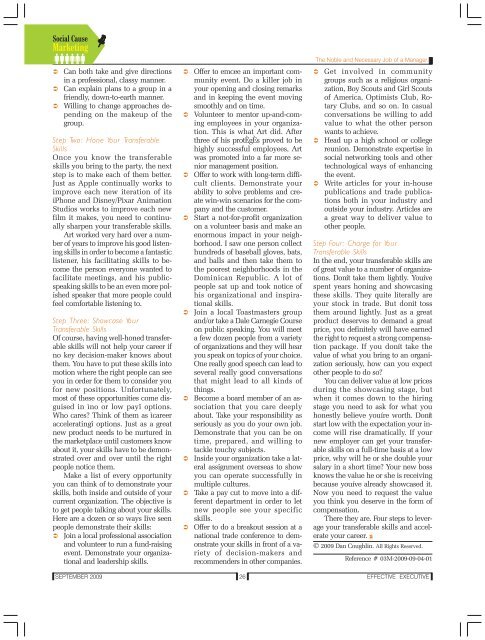Social Cause Marketing - The Regis Group Inc
Social Cause Marketing - The Regis Group Inc
Social Cause Marketing - The Regis Group Inc
Create successful ePaper yourself
Turn your PDF publications into a flip-book with our unique Google optimized e-Paper software.
Can both take and give directions<br />
in a professional, classy manner.<br />
Can explain plans to a group in a<br />
friendly, down-to-earth manner.<br />
Willing to change approaches depending<br />
on the makeup of the<br />
group.<br />
Step Two: Hone Your Transferable<br />
Skills<br />
Once you know the transferable<br />
skills you bring to the party, the next<br />
step is to make each of them better.<br />
Just as Apple continually works to<br />
improve each new iteration of its<br />
iPhone and Disney/Pixar Animation<br />
Studios works to improve each new<br />
film it makes, you need to continually<br />
sharpen your transferable skills.<br />
Art worked very hard over a number<br />
of years to improve his good listening<br />
skills in order to become a fantastic<br />
listener, his facilitating skills to become<br />
the person everyone wanted to<br />
facilitate meetings, and his publicspeaking<br />
skills to be an even more polished<br />
speaker that more people could<br />
feel comfortable listening to.<br />
Step Three: Showcase Your<br />
Transferable Skills<br />
Of course, having well-honed transferable<br />
skills will not help your career if<br />
no key decision-maker knows about<br />
them. You have to put these skills into<br />
motion where the right people can see<br />
you in order for them to consider you<br />
for new positions. Unfortunately,<br />
most of these opportunities come disguised<br />
in ìno or low payî options.<br />
Who cares? Think of them as ìcareer<br />
acceleratingî options. Just as a great<br />
new product needs to be nurtured in<br />
the marketplace until customers know<br />
about it, your skills have to be demonstrated<br />
over and over until the right<br />
people notice them.<br />
Make a list of every opportunity<br />
you can think of to demonstrate your<br />
skills, both inside and outside of your<br />
current organization. <strong>The</strong> objective is<br />
to get people talking about your skills.<br />
Here are a dozen or so ways Iíve seen<br />
people demonstrate their skills:<br />
Join a local professional association<br />
and volunteer to run a fund-raising<br />
event. Demonstrate your organizational<br />
and leadership skills.<br />
<br />
<br />
<br />
<br />
<br />
<br />
<br />
<br />
<br />
Offer to emcee an important community<br />
event. Do a killer job in<br />
your opening and closing remarks<br />
and in keeping the event moving<br />
smoothly and on time.<br />
Volunteer to mentor up-and-coming<br />
employees in your organization.<br />
This is what Art did. After<br />
three of his protÈgÈs proved to be<br />
highly successful employees, Art<br />
was promoted into a far more senior<br />
management position.<br />
Offer to work with long-term difficult<br />
clients. Demonstrate your<br />
ability to solve problems and create<br />
win-win scenarios for the company<br />
and the customer.<br />
Start a not-for-profit organization<br />
on a volunteer basis and make an<br />
enormous impact in your neighborhood.<br />
I saw one person collect<br />
hundreds of baseball gloves, bats,<br />
and balls and then take them to<br />
the poorest neighborhoods in the<br />
Dominican Republic. A lot of<br />
people sat up and took notice of<br />
his organizational and inspirational<br />
skills.<br />
Join a local Toastmasters group<br />
and/or take a Dale Carnegie Course<br />
on public speaking. You will meet<br />
a few dozen people from a variety<br />
of organizations and they will hear<br />
you speak on topics of your choice.<br />
One really good speech can lead to<br />
several really good conversations<br />
that might lead to all kinds of<br />
things.<br />
Become a board member of an association<br />
that you care deeply<br />
about. Take your responsibility as<br />
seriously as you do your own job.<br />
Demonstrate that you can be on<br />
time, prepared, and willing to<br />
tackle touchy subjects.<br />
Inside your organization take a lateral<br />
assignment overseas to show<br />
you can operate successfully in<br />
multiple cultures.<br />
Take a pay cut to move into a different<br />
department in order to let<br />
new people see your specific<br />
skills.<br />
Offer to do a breakout session at a<br />
national trade conference to demonstrate<br />
your skills in front of a variety<br />
of decision-makers and<br />
recommenders in other companies.<br />
<strong>The</strong> Noble and Necessary Job of a Manager<br />
Get involved in community<br />
groups such as a religious organization,<br />
Boy Scouts and Girl Scouts<br />
of America, Optimists Club, Rotary<br />
Clubs, and so on. In casual<br />
conversations be willing to add<br />
value to what the other person<br />
wants to achieve.<br />
Head up a high school or college<br />
reunion. Demonstrate expertise in<br />
social networking tools and other<br />
technological ways of enhancing<br />
the event.<br />
Write articles for your in-house<br />
publications and trade publications<br />
both in your industry and<br />
outside your industry. Articles are<br />
a great way to deliver value to<br />
other people.<br />
Step Four: Charge for Your<br />
Transferable Skills<br />
In the end, your transferable skills are<br />
of great value to a number of organizations.<br />
Donít take them lightly. Youíve<br />
spent years honing and showcasing<br />
these skills. <strong>The</strong>y quite literally are<br />
your stock in trade. But donít toss<br />
them around lightly. Just as a great<br />
product deserves to demand a great<br />
price, you definitely will have earned<br />
the right to request a strong compensation<br />
package. If you donít take the<br />
value of what you bring to an organization<br />
seriously, how can you expect<br />
other people to do so?<br />
You can deliver value at low prices<br />
during the showcasing stage, but<br />
when it comes down to the hiring<br />
stage you need to ask for what you<br />
honestly believe youíre worth. Donít<br />
start low with the expectation your income<br />
will rise dramatically. If your<br />
new employer can get your transferable<br />
skills on a full-time basis at a low<br />
price, why will he or she double your<br />
salary in a short time? Your new boss<br />
knows the value he or she is receiving<br />
because youíve already showcased it.<br />
Now you need to request the value<br />
you think you deserve in the form of<br />
compensation.<br />
<strong>The</strong>re they are. Four steps to leverage<br />
your transferable skills and accelerate<br />
your career.<br />
© 2009 Dan Coughlin. All Rights Reserved.<br />
Reference # 03M-2009-09-04-01<br />
SEPTEMBER 2009<br />
26<br />
EFFECTIVE EXECUTIVE








